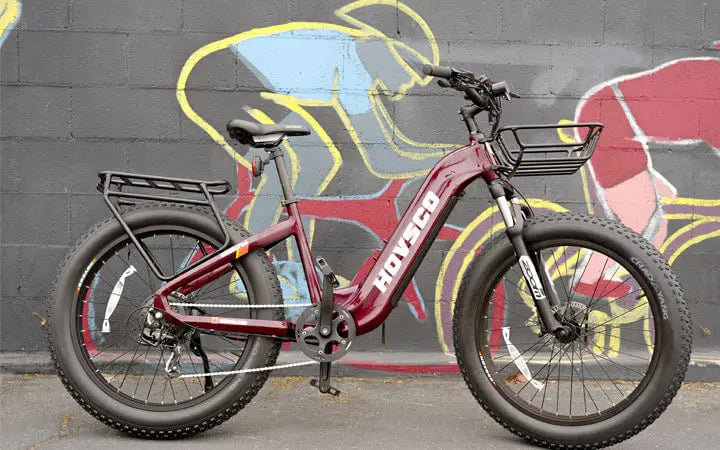
- by OfficialHOVSCO
Which is Better: 1000w or 750w Electric Bike for Men or Adults?
- by OfficialHOVSCO
Choosing between a 1000W and a 750W electric bike for men or adults hinges on your specific riding needs, terrain, and preferences. A 750W e-bike offers a balanced, efficient ride ideal for urban commuting and moderate hills with longer battery range and lighter handling. A 1000W e-bike delivers superior power, better hill-climbing, and faster acceleration, suited for heavier riders, steep climbs, and carrying loads, albeit often with less efficiency and more legal restrictions.
A 750W motor offers speeds up to about 28 mph with steady acceleration, supporting moderate hills and riders up to around 250 lbs efficiently. In contrast, a 1000W motor reaches higher speeds (up to 35 mph), accelerates faster, and provides more torque (up to 120 Nm), making it better suited for demanding terrains, heavy riders, and faster starts. However, the 1000W e-bike consumes more battery power, resulting in somewhat reduced range under similar conditions.
Generally, 750W e-bikes are more power-efficient and provide longer ranges—typically 40 to 50 miles—due to lower motor power consumption. Conversely, 1000W e-bikes have shorter ranges, often between 30 to 40 miles, as the higher power motor draws energy faster, especially when used aggressively on hills or rapid acceleration, impacting battery life and ride distance.
For urban commuting and moderate terrain, 750W e-bikes are preferable because they offer sufficient power for traffic speeds, better battery economy, and lighter overall weight for nimble handling in dense environments. They provide enough hill-climbing ability for typical city gradients and last longer between charges, enhancing daily usability.
1000W e-bikes excel on steep hills and rugged off-road terrains due to their increased torque and power delivery, offering effortless climbing and quicker acceleration. This power also benefits heavy riders (220+ lbs) and those carrying cargo or passengers, maintaining speed under load with less strain on the motor and rider. These bikes may be heavier and have reduced battery efficiency but deliver superior performance in demanding conditions.
Many regions legally restrict e-bike motor power to a maximum of 750W for street use, limiting 1000W e-bikes’ accessibility or requiring registration. Choosing a 750W bike often avoids regulatory hurdles, making it a practical choice for most riders in urban environments and complying with local laws, whereas 1000W models may face restrictions impacting where and how they can be ridden.
750W e-bikes tend to be lighter and more agile, enhancing maneuverability in traffic and tight spaces, benefiting everyday users and commuters. Conversely, 1000W e-bikes typically weigh more due to larger motors and batteries, which can affect handling and transport but contribute to stability on rugged or uneven terrain.
750W electric bikes generally cost less upfront and have lower maintenance expenses due to smaller motors and batteries. 1000W models often carry higher prices reflecting their increased motor power and sturdier components designed to endure demanding use, possibly requiring more frequent battery replacements due to higher power consumption.
When choosing between a 750W or 1000W electric bike, consider your typical riding conditions, weight, and legal constraints. Opt for a 750W e-bike for urban commuting, lighter loads, and longer range needs. Choose a 1000W e-bike if riding in hilly areas, carrying heavy cargo, or demanding rapid acceleration. Assess your budget against desired performance, factoring in potential regulatory compliance and maintenance costs. Test rides are valuable to evaluate handling and power responsiveness.
“HOVSCO values the delicate balance between power and efficiency in e-bikes. The 750W models exemplify this with their energy-efficient operation and sufficient urban performance, promoting longer rides and ease of control,” remarks a HOVSCO design specialist. “Conversely, our understanding of rider needs also highlights the importance of robust 1000W motors for those facing steep terrains or heavy cargo challenges, advancing comfort and capability."
“The future of e-biking lies in tailored solutions. Offering choices across motor wattages enables us to meet a broad spectrum of rider demands while emphasizing safety, durability, and enjoyment,” the expert adds.
Chart: Performance Comparison of 750W vs 1000W Electric Bikes
| Feature | 750W Electric Bike | 1000W Electric Bike |
|---|---|---|
| Top Speed | 25-28 mph | 30-35 mph |
| Torque | 60-90 Nm | 100-120 Nm |
| Hill Climbing | Handles moderate grades (10-15%) | Effortless on steep hills (>15%) |
| Ideal Rider Weight | Up to 250 lbs | 220 lbs and above |
| Terrain Suitability | Urban, light hills | Steep, off-road, heavy load |
| Battery Range | 40-50 miles | 30-40 miles |
| Weight | Lighter, easier handling | Heavier, more stable but less nimble |
| Price | Generally lower | Typically higher |
Q: Which electric bike motor is better for city commuting, 750W or 1000W?
A: A 750W motor is better suited for city commuting due to sufficient power, better battery efficiency, and easier handling in traffic.
Q: Can a 1000W e-bike handle steep hills better than a 750W?
A: Yes, a 1000W e-bike provides more torque and power, enabling effortless climbing on steep hills and rough terrains.
Q: Do 1000W e-bikes have shorter battery life compared to 750W?
A: Typically yes, because 1000W motors draw more power, which can reduce battery range if used at high torque levels continuously.
Q: Are there legal restrictions for using 1000W e-bikes?
A: Many regions limit e-bike motor power to 750W for legal street use; 1000W e-bikes might require registration or face use restrictions.
Share:
How to Check Electric Bike Motor and Battery Before Buying a Used Electric Bike
How to Choose the Right Cargo E-Bike for You in 2025
2 comments
In Asia allow only 31 mph . E moped.so 1000w can be legal
Great thorough information
Thank you